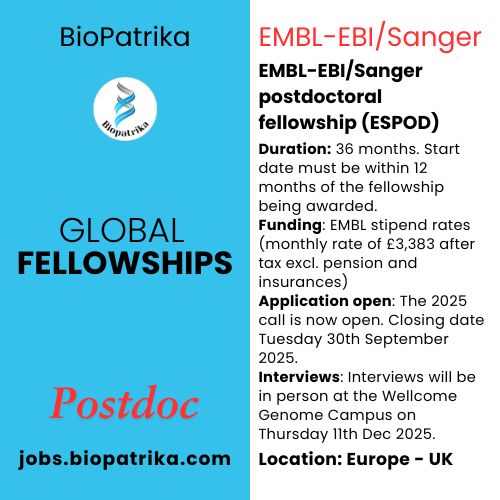EMBL-EBI-Sanger postdoctoral fellowships
Job Overview
-
Date PostedSeptember 6, 2025
-
-
Expiration dateSeptember 30, 2025
-
Click to apply:
Job Description
The EMBL-EBI–Sanger Postdoctoral (ESPOD) Programme builds on the collaborative relationship between EMBL-EBI and the Wellcome Sanger Institute, offering projects that combine experimental (wet-lab) and computational (dry-lab) approaches.
Both institutions are located on the Wellcome Genome Campus: their proximity fosters great opportunities for close collaborations. Our researchers have easy access to scientific expertise, well-equipped facilities and an active seminar programme.

Position: EMBL-EBI/Sanger postdoctoral fellowship (ESPOD)
Duration: 36 months. Start date must be within 12 months of the fellowship being awarded.
Funding: EMBL stipend rates (monthly rate of £3,383 after tax excl. pension and insurances)
Application open: The 2025 call is now open. Closing date Tuesday 30th September 2025.
Interviews: Interviews will be in person at the Wellcome Genome Campus on Thursday 11th December 2025.
2025 ESPOD projects
You may select your project from the pre-defined topics listed below. It is possible in your application to select more than one project area (max. three).
If you do decide to apply for multiple projects, you may wish to explain your motivation for this in your cover letter.
You may also propose your own project outside the areas below, as long as it involves at least one group from both EMBL-EBI and the Wellcome Sanger Institute. If you choose to propose a project that is not on the list, submit a full description (maximum: 1000 words) to the PIs you would like to work with for discussion. This description must be approved by the group leaders involved before you submit the application or your application will be rejected.
Please find the pre-defined topic descriptions below.
Project 1: Julio Saez-Rodriguez and Carl Anderson groups
Multicellular molecular characterisation of inflammatory bowel disease. Read more.
Project 2: Isidro Cortes-Ciriano and Roser Vento-Tormo groups
Single-cell multiomics to characterise how high grade serous ovarian cancer (HGSOC) originates and evolves. Read more.
Project 3: Jess Ewald and Gosia Trynka groups
Decoding morphological programmes of T cell activation through multimodal imaging and machine learning. Read more.
Project 4: Tim Coorens and Roser Vento-Tormo groups
Origins, footprints and consequences of mutations in endometrial stem cells. Read more.
Project 5: Christina Ernst and Muzz Haniffa groups
Development of Interactive Visualisation and Conversational AI Tools for Spatial Transcriptomics Data. Read more.
Project 6: Julio Saez Rodriguez and Mo Lotfollahi/Muzz Haniffa groups
Designing Efficient Single-Cell Perturbation Experiments with Lab-in-the-Loop AI Agents. Read more.
Project 7: Jess Ewald and Mo Lotfollahi groups
Predicting cellular phenotypes of unseen environmental compounds using flow matching models. Read more.
Application process
All applications for both the predefined projects listed above and self-proposed projects must be submitted through the EMBL jobs page. Here you will find a form to complete to specify which project/s you are applying for. No other application route will be accepted.
All applications must include:
- A cover letter describing your interests and experience relevant to the project/s you are applying for (pre-defined or proposed by the applicant)
- Your Curriculum Vitae
- Two recent letters of reference (referees may be contacted during the shortlisting process for further information)
Self-proposed project applications must also include a project description (maximum: 1000 words), which has been approved by the group leaders you wish to work with before submission.
If you have any questions about the project areas above, please contact the relevant group leaders. If you have any questions about the application process or the ESPOD scheme itself, please email us on: ESPOD@ebi.ac.uk.




